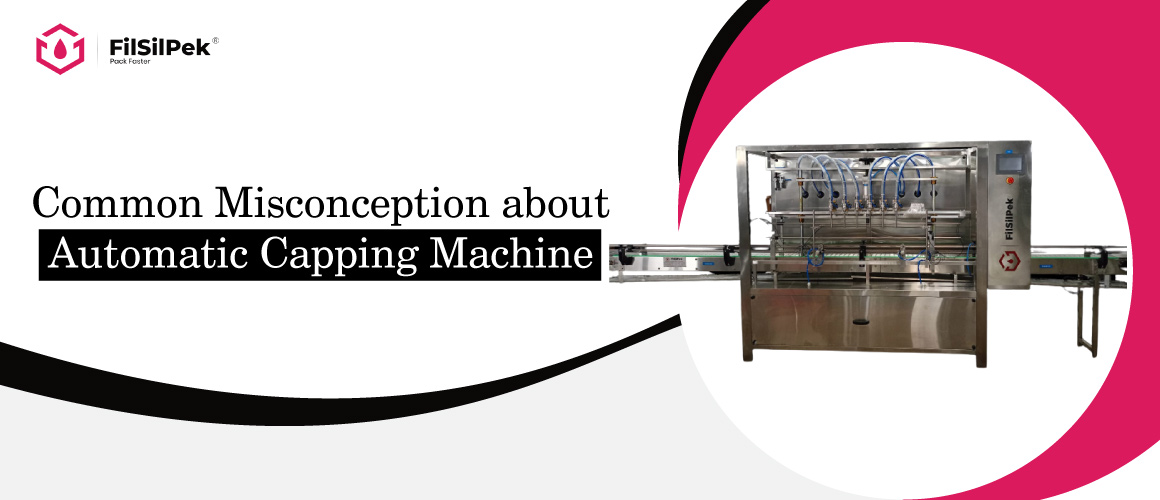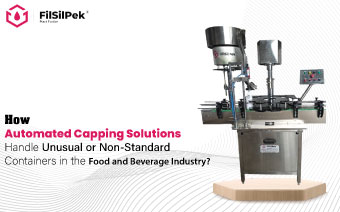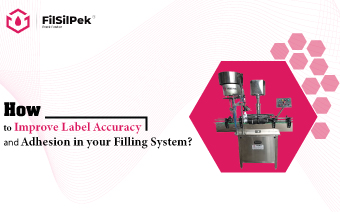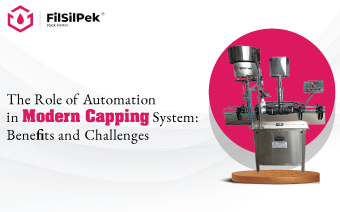Common Misconception about Automatic Capping Machine
Automatic capping machines have become essential components in the manufacturing and packaging industry, guaranteeing accuracy and efficiency. These devices are essential for safely sealing a wide range of capped containers, from food and beverage items to pharmaceuticals, as technology develops.
There are still misconceptions regarding the complexity and variety of automatic capping devices, despite their widespread use.
We attempt to clear up these myths in this article by highlighting the automated capping machines’ broad range of applications and user-friendliness, as well as providing a better understanding of their function in modern manufacturing operations.
Concept of Automatic Capping Machine
An automatic capping machine stands as a technological cornerstone in contemporary packaging solutions. At its core, it is a sophisticated device designed to streamline and enhance the sealing process of various containers. Unlike manual capping methods, which are labor-intensive and prone to inconsistencies, automatic capping machines bring efficiency and precision to the forefront. These machines are engineered to automatically secure caps onto containers, ensuring a tight and reliable seal. Their significance lies in their ability to not only expedite the packaging process but also to maintain the integrity and quality of the packaged products.
5 Key Elements of Automatic Capping Machine
Cap Feeding System:
Ensures a continuous and orderly supply of caps, facilitating the efficient capping process.
Capping Head:
Physically places the cap onto the container with precision, ensuring a tight and reliable seal.
Control System:
Orchestrates and synchronizes the movements of the cap feeding system and capping head, ensuring a seamless and error-free operation.
Container Handling Mechanism:
Manages the proper positioning and movement of containers to align them with the capping head for accurate cap placement.
Sensor Technology:
Utilizes advanced sensors to detect and adapt to variations in container and cap sizes, enhancing the adaptability and versatility of the capping machine.
Working Process of Automatic Capping Machine:
Cap Feeding
Caps are systematically supplied to the capping machine through the cap feeding system.
Container Positioning
Containers are precisely positioned to align with the capping head for accurate cap placement.
Capping Head Movement
The capping head moves in a controlled manner to pick up the cap and position it above the awaiting container.
Cap Placement
With precision, the capping head places the cap onto the container, creating the initial connection for the sealing process.
Sealing Action
The capping head engages in a specific sealing action, securing the cap onto the container with the required force for a tight and reliable seal.
Quality Check
Advanced sensors conduct real-time quality checks, ensuring proper sealing and addressing any deviations in the process.
Container Discharge
Sealed containers are discharged, ready for the next phase of the packaging line.
Continuous Operation
The entire process is regulated by the control system, enabling a seamless and continuous operation of the automatic capping machine.
3 Common Myths about Automatic Capping Machines
Lack of Versatility
One common misconception is that automatic capping machines are limited in their applicability. Contrary to this belief, these machines are highly versatile and can handle a wide range of caps and containers, accommodating diverse packaging needs.
Complex Operation
Another myth revolves around the complexity of operating automatic capping machines. In reality, advancements in technology have led to user-friendly designs, making these machines easy to set up, operate, and maintain.
Incompatibility with Various Industries
Some may believe that automatic capping machines are only suitable for specific industries. However, these machines find applications across various sectors, including pharmaceuticals, food and beverage, cosmetics, and more. Their adaptability makes them a valuable asset in different manufacturing landscapes.
Benefits of Automatic Capping Machines:
Enhanced Operational Efficiency:
Automatic capping machines significantly boost operational efficiency by streamlining the sealing process, reducing manual labor, and increasing overall production speed.
Consistent Precision:
The precision of automatic capping machines ensures a uniform and reliable seal on every container, eliminating variations and enhancing the overall product quality.
Reduced Labor Dependency:
By automating the capping process, these machines diminish the need for extensive manual intervention, allowing businesses to allocate human resources to more intricate tasks.
Cost Savings in the Long Run:
Despite initial investments, automatic capping machines lead to long-term cost savings through increased productivity, decreased error rates, and reduced labor costs.
Adaptability to Diverse Caps and Containers:
Automatic capping machines exhibit remarkable versatility, accommodating various cap types and container sizes, making them suitable for a wide range of packaging needs.
Improved Safety and Product Integrity:
The automated precision of these machines not only ensures a secure seal but also enhances safety by reducing the risk of human errors. This, in turn, preserves the integrity of the packaged products.
Enhanced Scalability:
Automatic capping machines are designed to scale with the growing demands of production. Their ability to handle increased workloads makes them an adaptable and future-proof solution for expanding businesses.
Applications of Automatic Capping Machines:
Pharmaceutical Industry:
Precision Sealing: Automatic capping machines ensure precise and tamper-evident sealing of medication containers, meeting critical pharmaceutical standards.
Safety Compliance: Contributing to the maintenance of efficacy and safety, these machines adhere to stringent industry regulations.
Batch Integrity: Ensuring batch integrity with consistent and reliable sealing, essential for pharmaceutical manufacturing standards.
Customizable Solutions: Automatic capping machines offer customizable solutions to accommodate various packaging needs, from different bottle sizes to cap types.
High Throughput: With efficient sealing processes, these machines contribute to high throughput in pharmaceutical production lines.
Food and Beverage:
Preserving Freshness: In the food and beverage industry, automatic capping machines play a key role in sealing bottles and containers to preserve product freshness.
Contamination Prevention: These machines help prevent contamination, ensuring the safety and quality of consumable products.
Customizable Solutions: Automatic capping machines offer customizable solutions to accommodate various packaging needs, from different bottle sizes to cap types.
Cosmetics and Personal Care:
Aesthetic Presentation: Automatic capping machines contribute to the aesthetic presentation of cosmetic and personal care products by securely sealing various containers.
Marketability Boost: The consistent and reliable sealing enhances the overall marketability of cosmetic products, meeting consumer expectations.
Flexible Cap Handling: These machines excel in handling a variety of cap styles and materials, catering to the diverse needs of the cosmetics industry.
Chemical Manufacturing:
Adaptability: Automatic capping machines offer adaptable solutions for securely sealing chemical products, accommodating diverse container types.
Safety Assurance: Contributing to safety in chemical manufacturing by ensuring proper sealing and compliance with industry regulations.
Multi-Viscosity Handling: With specialized features, these machines can handle containers with different viscosities, ensuring secure sealing for a wide range of chemical products.
Customizable Torque Settings: Automatic capping machines allow customizable torque settings, providing flexibility for different cap types and materials.
Reduced Contamination Risk: The automated sealing process minimizes the risk of contamination in chemical products, ensuring product purity.
Beverage Production:
Efficiency and Quality: Automatic capping machines play a pivotal role in sealing bottles with speed and precision, enhancing overall production efficiency.
Leak Prevention: Contributing to preventing leaks, preserving beverage quality, and maintaining consumer satisfaction.
Integrated Quality Checks: Many automatic capping machines include integrated quality control measures, such as torque monitoring, ensuring the highest quality seals for beverage containers.
Adaptive Cap Handling: These machines are designed to handle a variety of cap styles and sizes, adapting to the diverse packaging needs of the beverage industry.
In conclusion,
automatic capping machines are not only versatile and easy to operate but also dispel common misconceptions. Their widespread applications and undeniable benefits position them as indispensable tools in modern manufacturing. As industries continue to embrace automation, understanding the truth behind automatic capping machines becomes paramount for informed decision-making and optimal packaging solutions.
How Automated Capping Solutions Handle Unusual or Non-Standard Containers in the Food and Beverage Industry?
The food and beverage industry faces significant challenges when it comes..
How to Improve Label Accuracy and Adhesion in your Filling System?
Automation in modern capping systems is transforming the packaging industry by increasing efficiency, improving…
The Role of Automation in Modern Capping System: Benefits and Challenges
Automation in modern capping systems is transforming the packaging industry by increasing efficiency, improving…



